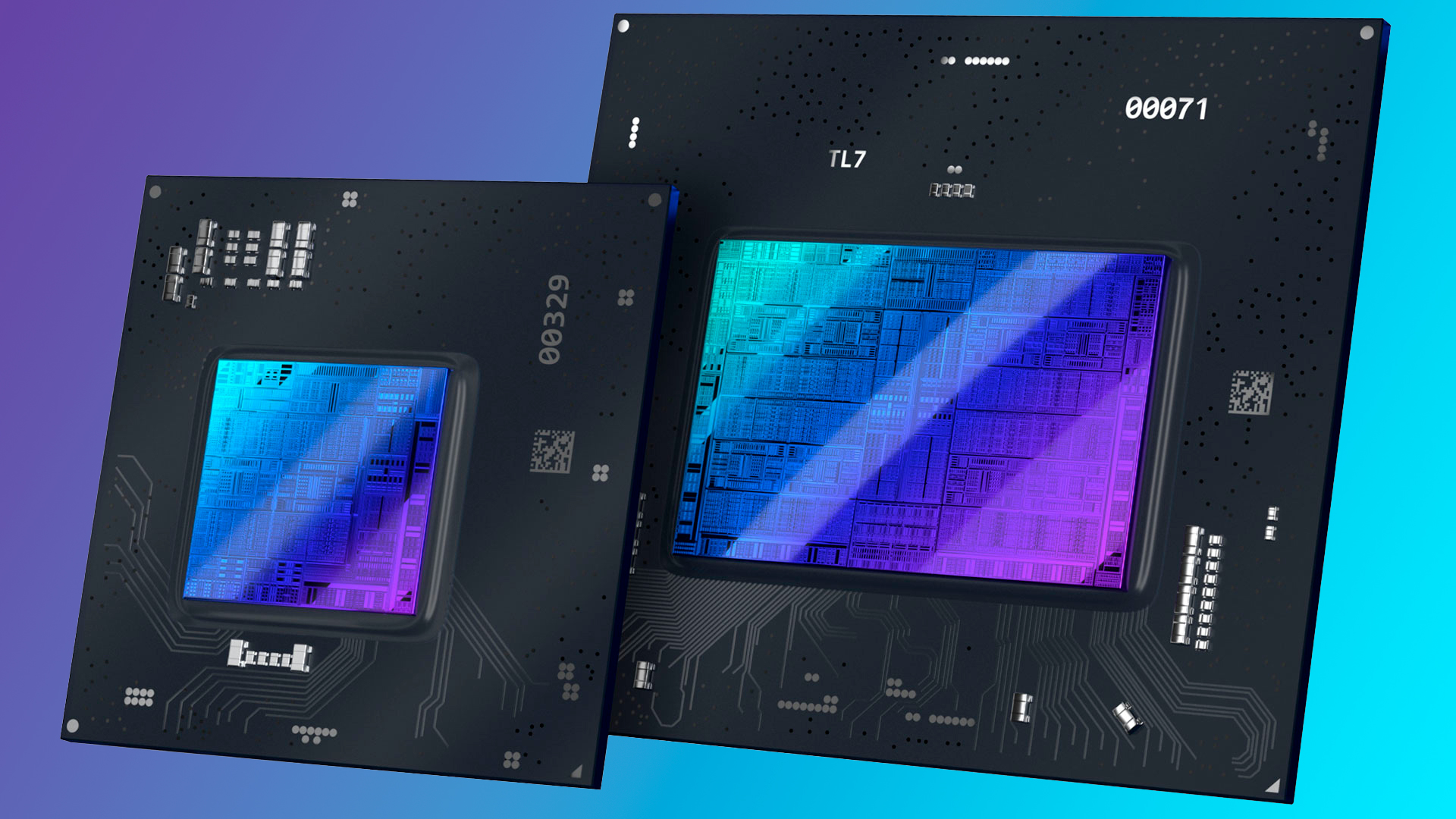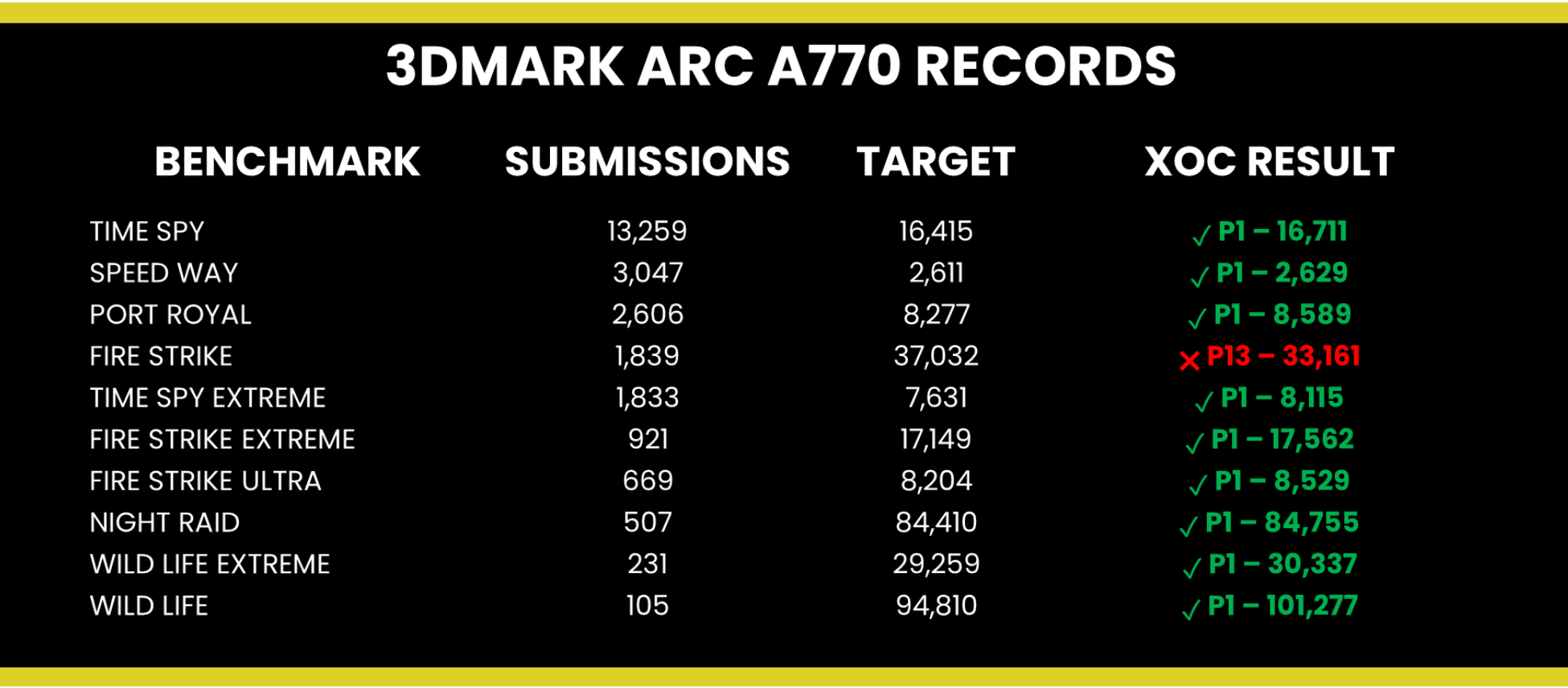Intel Arc A770 Gets Sub-Zero Treatment, Hits 3.6 GHz
Intel's Arc A770 gets the liquid nitrogen treatment.

Intel positions its Arc A770 desktop graphics card as a midrange board for gaming. Many midrange graphics cards come factory-overclocked, but applying extreme overclocking to such GPUs isn't too common — you won't set a new overall performance record. But SkatterBencher decided to set a record for the fastest Intel Arc GPU and gave his Acer Predator BiFrost A770 the liquid nitrogen treatment, achieving impressive results.
SkatterBencher succeeded in pushing the Intel Alchemist GPU to 3586 MHz, up from the default 2400 MHz boost clock. Of course, the graphics processor became highly unstable at this level and the overclocker could only maintain this frequency for a few seconds before the screen froze, necessitating a system reboot. During this process, the temperature of the liquid nitrogen container was -80°C, while the GPU's temperature hovered around -50°C.
The overclocking results varied greatly depending on the type of workload as well.
- Light Workload: The GPU was able to reach a peak frequency of 3400 MHz at 1.285V. The GPU temperature was approximately -30°C.
- 3DMark Benchmark: During a 3DMark benchmark, the GPU could hit a maximum frequency of 3100 MHz. However, ScatterBencher was unable to complete more than one Time Spy game test at this speed.
- Complete 3DMark run: The GPU was able to run at 3012 MHz at 1.12V to complete a full 3DMark benchmark run. This frequency was necessary to achieve the top position in the 3DMark Night Raid benchmark among the A770 boards.
Although SkatterBencher managed to significantly improve the performance of Intel's Arc A770 by overclocking it in an extreme way to 3 GHz and beyond — a 25% increase over its default boost frequency — the board still cannot compete against more advanced graphics cards from AMD and Nvidia. For example, a stock clocked RTX 4070 Founders Edition typically gets around 17,500 in Time Spy, 5% higher than the LN2-cooled Arc A770.
While it's generally possible to overclock Intel's Arc A770 using the Arc OC Tool software (to overcome the factory-set voltage-frequency curve and dynamically adjust the boost frequency), this GPU is not exactly friendly to extreme overclocking. SkatterBencher encountered several challenges while overclocking the Intel Alchemist GPU.
First, all Intel Arc A770 graphics cards come with board power limit of 228W, even under ambient cooling conditions. That's why SkatterBencher used the Predator Bifrost software application and manipulated the profiles to apply higher power limits to bypass this.
The Arc A770 GPU also automatically reduces the operating frequency when the voltage exceeds a certain threshold due to a voltage performance throttle. On the A770, this throttling mechanism kicks in when the set voltage is over 1.2V. SkatterBencher resolved this issue by switching the voltage regulator control mode from SVID (which adjusts the output voltage based on the GPU request) to PMBus. This allows you to program the MPS MP2979 voltage controller output voltage directly using the ElmorLabs EVC2 device without interference from the GPU.
Finally, VRM design with six power stages encounters difficulties when the power consumption exceeds 330W. When the VRM temperature reaches 110°C, it reduces the GPU clock to its base frequency of 2100 MHz. To overcome this, the overclocker adjusted the voltage controller's VR_HOT threshold to provide additional thermal headroom.
Despite the difficulties, it's interesting to see just how far SkatterBencher was able to push the Arc A770. Breaking the 3 GHz mark on a chip architected to run in the low to mid 2 GHz range, even with all the protection mechanisms, was no mean feat. Don't be surprised if other extreme overclockers push beyond these records in the coming months.
Get Tom's Hardware's best news and in-depth reviews, straight to your inbox.

Anton Shilov is a contributing writer at Tom’s Hardware. Over the past couple of decades, he has covered everything from CPUs and GPUs to supercomputers and from modern process technologies and latest fab tools to high-tech industry trends.
